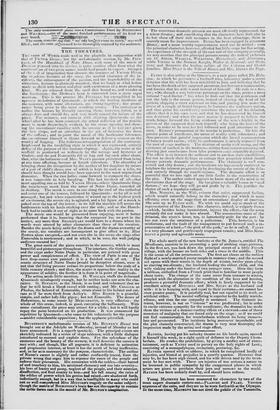THE THEATRES.
name of WvuEn reads well in the playbills in conjunction with that of VIcroat HuGo ; but the melodramatic version, by Mr. Fuz- Ea 11, of the Hum:Aback of Noes,: Dame, with some of the music of Prfriesa p'.essed into its service, is quite another affair from whut the comhinno.on of two great names would lead people to expect. Stripped of the v .41 of imagination that shrouds the romance of VICTOR HUGO, the re.oulsive features of the story, the morbid character of the in. cidents, the extravagance of the passion, and the improbability of the situations, become so glariegly manifest, that we laugh at what before made us thrill with horror and glow with excitement of a more pleasing kind. We are released from the spell that bound us, and wonder at the fascination : the Medusa's head is concerted into a mere caput morinuni. This is the process Mr. FITZBALL has exemplified in his operatic melodrama of 'Quasi/node ; in which the leading incidents of the romance, with some alterations, are strung together; due promi- nence being given to the most revolting scenes. The endeavour to realize the horrors by literally enacting them, however, failed, as it always does and should do; and very nearly caused the failure of the piece. For instance, not content with showing Quasimodo on the wheel after he has been scourged, the actual indiction of the punish- ment is made disgustingly evident, by the scene opening and show- ing the executioner standing with the scourge as if lie had just given the last stripe, and an attendant in the act of fitstening the dress of the sufferer ; and to point the moral of this loathsome inference, the executioner himself is thrust forward to deliver a sermon on the cruelty of flogging. The ludicrous misappropriation of the sentiment, heightened by the twaddling style in which it was expressed, entirely defeated the purpose of this humane claptrap. Again, the scene at the scaffold is protracted so tediously by the ravings and hysterics of Gudule, and she and Estneralda did so hug and lug each other about, that, what the hollowness of Mrs. WEST'S passion prevented from being at any time affecting, became at length ridiculous. The absurdity of bringing about the recognition by the mother of her daughter by means of a pair of child's shoes, one of which is kept by each as a relic, we should have thought would have !wen apparent to the most unpractised dramatist. When the two ladies came forward to compare the shoes, it was impossible to help laughing. The last incident of all—that most appalling one as told by VICTOR HUGO—where Quasimodo flings the treacherous monk from the tower of Notre Dame, exceeded all in drollery. The monk is seen to run along the roof of the cathedral and enter one of the towers, followed by Quasimodo : so far all is well managed ; but just- when expectation is wound up to the highest pitch of excitement, the scenic sky is agitated, and a lay figure of a monk is poked over the top of the tower : in its fall the mawkin fell across the battlements with its heels sticking over the side ; and so the Hunch- back had to tumble it out of sight as he came back with the pardon.
The music one would be prevented from enjoying, were it better performed than it is, knowing that the composer has no part in the matter, any more than Suaespearte would have in a drama where his words were uttered by other characters than those of his creation. Besides the music being unfit for the drama and the drama unworthy of the music, the vocalists are incompetent to give effect to it; Miss ROMER alone excepted,—and not even she in the scene she sings after Esmeralda is condemned ; and in which, to be sure, the well-judging audience encored her !
The great merit of the piece consists in the scenery, which is most beautiful and picturesque throughout. The interiors, the Gothic saloon, and the crypt under Notre Dame in particular, are painted with great power and completeness of effect. The view of Paris is one of the best drop-scenes ever painted : it is a finished work of art. The scenic structure of Notre Dame iwould be deceptive almost, were it not that thtrliving persons reduce its proportions below the scale of a little country church ; and thus, the nearer it approaches reality in the appearance of solidity, the further it is from it in point of magnitude. The acting needs little mention. H. WALLACE stuffs the deformed Quasimodo misshapenly enough, but he neither looks nor acts the cha- meter. G. BENNETT, as the Monk, is so loud and vehement that we fear he will break a blood-vessel with ranting ; and Mr. COLLINS, as Phoebus, the beloved of Esmeralda, struts about in his helmet and cui- rass as if he were fresh from Astley's. Miss ROAMER is a graceful, simple, and rather lady-like gipsy ; but not Esmeralda. The dance of Bohemians, to some music by MERCADANTE, is very effective : the whole of this scene, indeed, is good, excepting the buffoonery. With some curtailment the piece may attract for a while ; but it will hardly repay the pains bestowed on its production. It was announced for repetition by Quasimodo—who came to life voluntarily for the purpose —amidst considerable opposition ; but the applause prevailed.






























 Previous page
Previous page